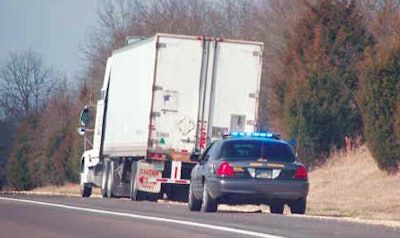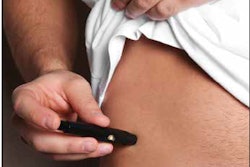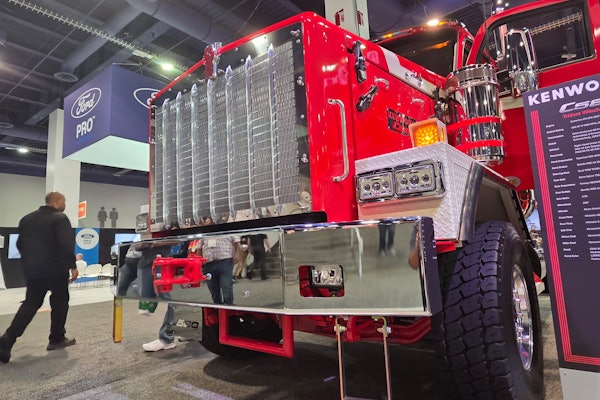The Trucking Law segment is a monthly feature on Overdrive, in which we pose commonly asked questions from truckers and owner-operators to legal experts. In this installment, attorney Brad Klepper explores how to best handle getting pulled over by police and the aftermath of receiving a traffic ticket. Find all Trucking Law installments via this link.
 During a roadside stop, be cooperative in answering questions, but avoid unnecessarily volunteering information.
During a roadside stop, be cooperative in answering questions, but avoid unnecessarily volunteering information.I go to a lot of truck shows. When I do, I get lots of legal questions. Many concern handling traffic stops and minimizing the damage that can come from a citation.
You see the flashing lights and pull off the road. How do you best react in this situation?
First, note that a traffic ticket is nothing until it becomes a conviction. That happens when you pay the fine, when you fail to show up for court on the appointed day, or when the judge or jury has heard the evidence and decides you are guilty. However the conviction is determined, it will show up on your motor vehicle record.
So never just pay a ticket and admit guilt. And never fail to show up for a court date. Doing either is just handicapping your job and possibly killing your trucking career.
As for what happens in court, there’s a lot you can do to tilt the outcome in your favor. It starts at the scene of the citation issuance.
 Brad Klepper is president of Interstate Trucker, a law firm dedicated to defending drivers. He is also president of the discount services firm Drivers Legal Plan. He can be reached at 800-333-3748, InterstateTrucker.com and DriversLegalPlan.com.
Brad Klepper is president of Interstate Trucker, a law firm dedicated to defending drivers. He is also president of the discount services firm Drivers Legal Plan. He can be reached at 800-333-3748, InterstateTrucker.com and DriversLegalPlan.com.Remain calm and professional. Treat the officer with respect. You will never win any arguments with an officer who is wearing a badge and carrying a gun. Choosing to argue will only ensure you a citation and a possible jail visit. In addition, the officer will note your attitude on the citation, which can hurt its outcome.

An officer in this situation never knows what he might be encountering, so do what you can to put him at ease. When talking with the officer, keep your hands visible. If it’s nighttime, turn on the cab light. The more agreeable you are, the better the roadside interaction will go.
Above all else, do not convict yourself! Be careful of the words you choose and the information you provide. Answer questions directly, but never volunteer information lest you incriminate yourself.
I hear accounts like this all the time: A driver gets asked if he knows why he was pulled over. He responds, “I was probably going 70 mph” in a lower speed zone. Or he’ll say he was doing “just a little over the limit,” as if that’s OK. Both are an admission of speeding. The officer’s report will note that.
Instead, ask the officer how fast he thought you were going. Or admit you are unsure of your exact speed at the time in question, which should be true if you’re keeping your eyes mostly on the road and your mirrors. Refrain from simply agreeing with whatever he says.
As soon as the stop is over, one of the best things you can do is record, either as a voice message on your phone or as a written note, everything that happened before, during and after the stop. You will be able to use this information later to refresh your memory if you are a witness on the stand.
The judicial system understands that data recorded at the time of the incident is more accurate than someone’s memory much later. That makes your written or recorded information more accurate in the court’s mind than that of the officer who makes 25 traffic stops a day and has to recall you specifically weeks or months later.









